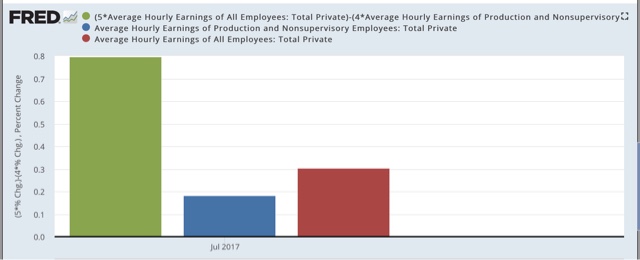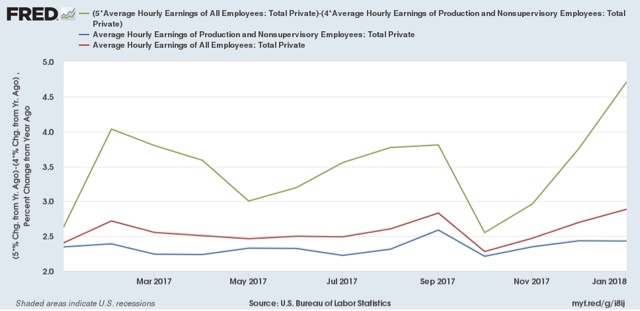Why I’m not impressed by January’s 2.9% YoY wage growth I wanted to follow up on why I dissented Friday from the near-consensus take that workers finally got a nice raise, with many citing hikes in the minimum wage. As you may recall, the YoY% change in the average hourly earnings of all employees rose 2.9% as of January. That was the story in, for example, Marketwatch: Average hourly wages jumped 9 cents, or 0.3%, to .74, according to the Bureau of Labor Statistics. That means wages have increased 2.9% over the last year — the biggest gain since the end of the Great Recession in June 2009.The federal minimum wage is .25 an hour and hasn’t increased since 2009. But many states and municipalities enacted laws to raise the wage this year. Even
Topics:
NewDealdemocrat considers the following as important: Taxes/regulation, US/Global Economics
This could be interesting, too:
Joel Eissenberg writes How Tesla makes money
Angry Bear writes True pricing: effects on competition
Angry Bear writes The paradox of economic competition
Angry Bear writes USMAC Exempts Certain Items Coming out of Mexico and Canada
Why I’m not impressed by January’s 2.9% YoY wage growth
Average hourly wages jumped 9 cents, or 0.3%, to $26.74, according to the Bureau of Labor Statistics. That means wages have increased 2.9% over the last year — the biggest gain since the end of the Great Recession in June 2009.The federal minimum wage is $7.25 an hour and hasn’t increased since 2009. But many states and municipalities enacted laws to raise the wage this year.
{A]verage hourly earnings for private-sector workers increased by 0.34 percent this month, and 2.9 percent over the past year.Wage levels have struggled to gain traction in recent years, even as the labor market has tightened. But for labor economists and workers alike, these most recent increases could be a sign that wages might finally be on the upswing, thanks to progressive state policies. In the new year, 18 states across the country—from Florida to Maine, and from Washington state to Michigan—hiked their minimum wages, bringing $5 billion in additional pay to 4.5 million workers, according to the Economic Policy Institute.
There were some weak spots in the report. Wage growth for the lower-paid 80% of the workforce that have production or non-managerial jobs was up only 2.4%, implying that faster wage growth last month mostly benefited higher-paid workers.
It looks like bosses got, on average, a 2% bonus over and above their regular January wage, bonuses which were not shared with workers. And these are nominal numbers, so if consumer prices wewnt up 0.2% in January (we don’t know yet), workers got nothing, while their bosses got a nice pop.


